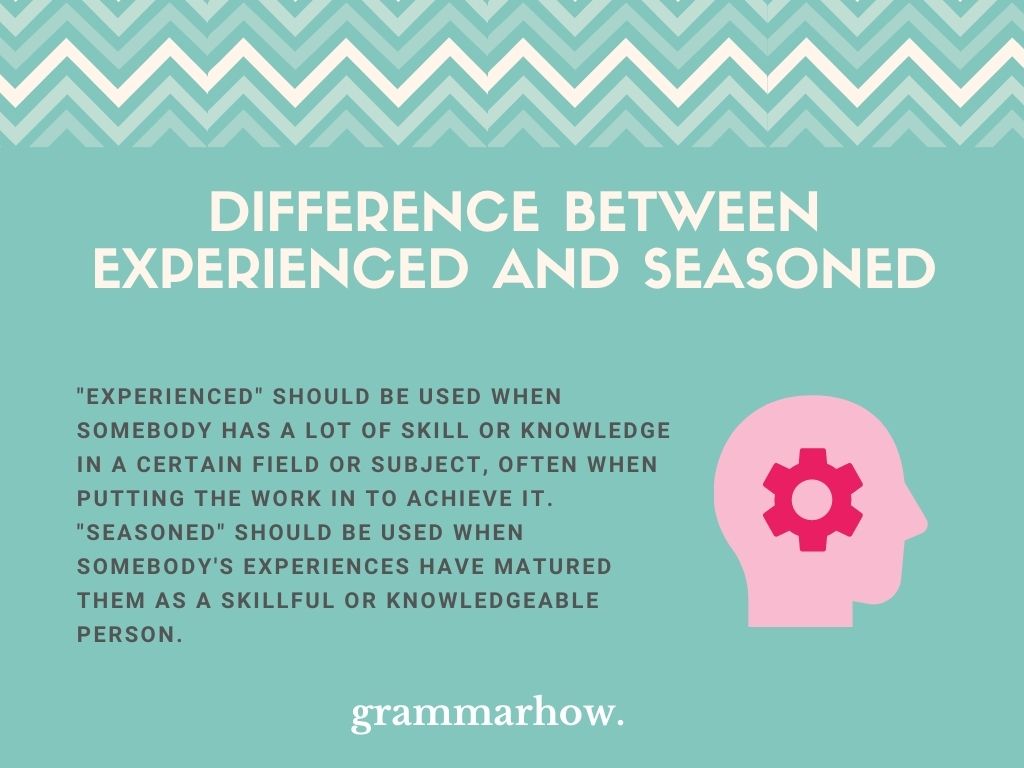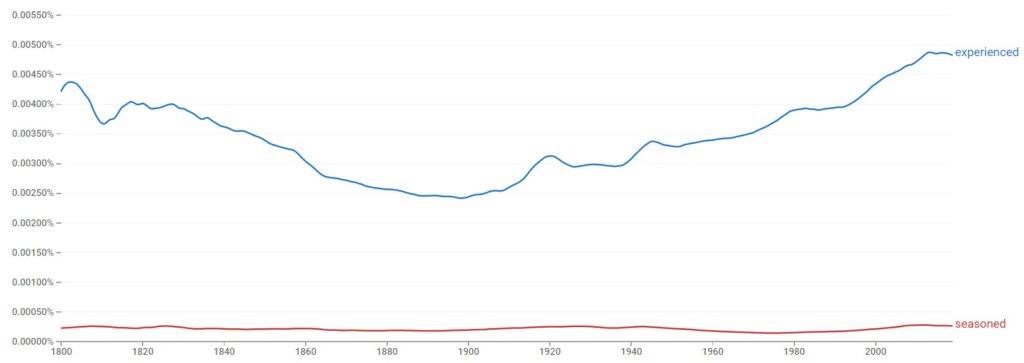The words “experienced” and “seasoned” both refer to someone who has a lot of skill or knowledge. However, there’s an important difference that you should know between the two. In this article, we’ll explore what those differences are and how to work with them.
What Is The Difference Between Experienced And Seasoned?
“Experienced” should be used when somebody has a lot of skill or knowledge in a certain field or subject, often when putting the work in to achieve it. “Seasoned” should be used when somebody’s experiences have matured them as a skillful or knowledgeable person.

According to The Cambridge Dictionary, the definition of “experienced” is “having skill or knowledge because you have done something many times.”
According to The Cambridge Dictionary, the definition of “seasoned” is “having a lot of experience of doing something and therefore knowing how to do it well.”
The phrases are different because “experienced” talks about simply having skill from doing something multiple times, while “seasoned” refers to learning and maturing those skills while being experienced.
The maturity of “seasoned” is what’s most important. Some people who are “experienced” don’t have the maturity in their skills to do them to the best degree.
Can Experienced And Seasoned Be Used Interchangeably?
So, the two words are almost identical in meaning. Looking at the dictionary definitions from above, you can see that “seasoned” even used the word “experience” inside it.
For the most part, both words are used interchangeably.
You can use either one to mean that someone has a lot of skill or knowledge in a subject. Most native speakers won’t know that there’s much of a difference between the two. For this reason, you’ll find that there is no discernible difference in most writing cases.
Is Experienced Or Seasoned Used The Most?
Since they’re mostly used as interchangeable words, we thought it would help for you to see which one gets used more. That way, you can make sure you’re using the most popular word that most native speakers are used to hearing or reading.
According to this graph, “experienced” is, and has always been, the vastly more popular word of the two. “Seasoned” is almost never used in comparison and has had no major fluctuations in usage over the last two centuries.

To push those statistics even further, according to Google, “Experienced” is mentioned 162,000 times on The New York Times website, while “Seasoned” is mentioned 90,900 times.
Examples Of How To Use “Experienced” In A Sentence
So, let’s go over some examples of using the two. We’ll start with “experienced.” Remember, there is a very subtle difference between the two words that we’ll try to highlight with these examples.
Both “experienced” and “seasoned” are used interchangeably while having slightly different meanings. These examples will highlight the similarities as well as the differences.
- You’re very experienced in the field of science, aren’t you?
- I’m experienced when it comes to handling money.
- They’re experienced employees, and I couldn’t ask for anyone better.
- We’re experienced when it comes to dealing with matters of the heart.
- He’s experienced because he’s put a lot of time into learning the ins and outs of it.
- I’m experienced with these things.
As you can see, “experienced” is an adjective. We use it to describe someone (based on the pronoun) used in the sentence.
We can use it to say that we’ve developed considerable skills or knowledge over time based on the subject we’re experienced in. It’s quite a useful phrase to use on a resumé, and it stands out to employers when you let them know you’re experienced in the things they’re looking for.
Examples Of How To Use “Seasoned” In A Sentence
Now let’s see how to use “seasoned.” Again, the two words are somewhat synonymous, so you might not notice too much of a difference between the sentences.
The biggest differences come from context. While the sentence may look the same, “experienced” mean someone has knowledge of something, while “seasoned” means they can put that knowledge to the test with the maturity they’ve gained from it.
- You’re a seasoned traveler in these parts, and I need your help!
- I’m a seasoned chef. Ask me to make anything, and I’ll do it.
- They’re both seasoned athletes; no one can beat them on the track.
- We’re seasoned veterans, so don’t try anything funny.
- She’s a seasoned martial artist. I wouldn’t mess with her.
- I’m a seasoned specialist in this field.
Again, “seasoned” is an adjective we use to talk about having plenty of knowledge of skills in certain areas. Generally, being “seasoned” is a slight step above “experienced” (if you’re using them with their different meanings).
It means that someone has the ability to apply their skills and knowledge to a more powerful degree than someone who is simply “experienced.”
Experienced And Seasoned – Synonyms
If you’re struggling to understand the major differences between the two words, you might want to try a synonym. We find that synonyms and alternatives are a great way for us to broaden our vocabulary while still using the meaning we want.
- Expert
Calling yourself or someone else an expert in a field or subject is another way to say that you’ve got plenty of time and practice with it. Many people believe “experts” to be the absolute best of the best, so use it carefully.
- Veteran
You can be a “veteran” in a field or subject if you’ve spent a lot of time studying it or making sure your skills are up to scratch.
- Knowledgeable
We can simply call ourselves “knowledgeable” if we don’t want to fully commit to saying “experienced” or “seasoned.” It’s not quite as powerful an adjective, but it still works well to say we have knowledge in certain areas.
Should You Use “Seasoned” In A Resume?
You can use “seasoned” in a resumé to talk about skills and knowledge you have related to what an employer is looking for. It’s less common to use than “experienced,” so it might make your resumé stand out from the crowd rather than using the same words as everyone else.

Martin holds a Master’s degree in Finance and International Business. He has six years of experience in professional communication with clients, executives, and colleagues. Furthermore, he has teaching experience from Aarhus University. Martin has been featured as an expert in communication and teaching on Forbes and Shopify. Read more about Martin here.

